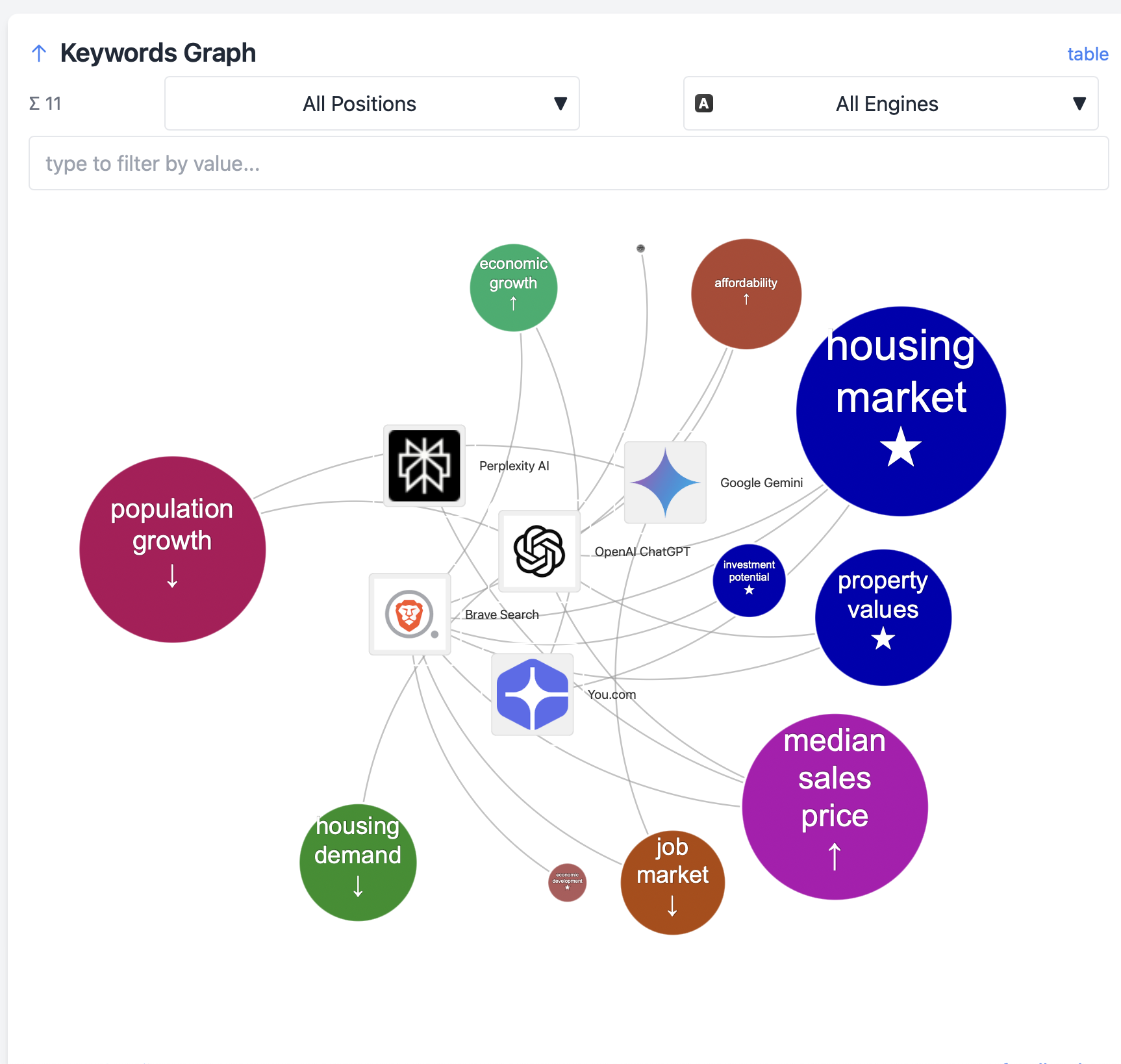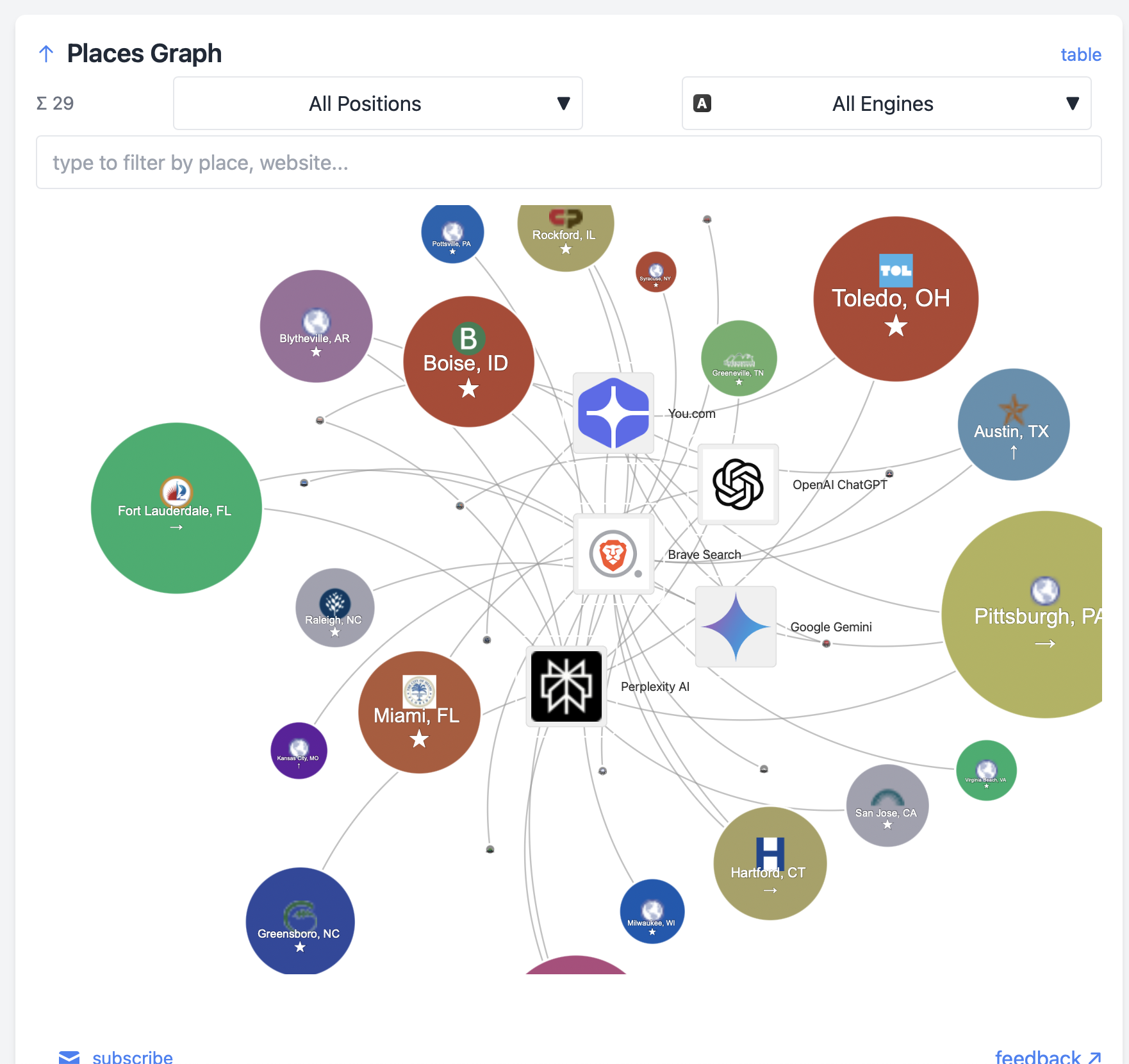How AI Engines Analyze US Real Estate Growth Markets
Table of Contents
We're excited to share our latest AI Search Watch report that analyzes how top AI engines respond to questions about the fastest-growing real estate markets in the US. Using advanced analysis across 6 major AI engines, we've uncovered fascinating patterns in how AI processes and presents real estate market data—insights that echo findings from our luxury possessions analysis.
Curious how these trends compare to other high-end investments? Check our luxury possessions report for a different perspective on AI-driven insights.
Want to see how luxury spending trends compare? Explore our AI analysis of billionaire possessions for more context.
Key Findings
-
Keywords: Analysis identified key terms like "housing market," "population growth," and "median sales price" across AI responses, with housing market being the most frequently referenced term (50% of responses).
-
Sources: The report analyzed 44 distinct sources, with blogs and personal websites accounting for 41% of citations, followed by news media at 25%.
-
Sentiments: AI responses showed consistently positive sentiment (65-70%) across all engines, with minimal negative sentiment (5%).
Deep Look deep at the Data
The report analyzes responses from six major AI engines including OpenAI ChatGPT, Brave Search, Google Gemini, You.com, and Perplexity AI, revealing Pittsburgh as the most-cited growth market with a 22% annual price increase.
Southern and Southeastern markets dominated the AI responses, with particular focus on cities in Florida and Texas. Mid-sized cities received especially more attention than major metropolitan areas.
Frequently Asked Questions
1. What is the focus of this AI real estate report?
The report analyzes how six major AI engines evaluate real estate markets. It examines key terms. It looks at sentiment trends. It focuses on the fastest-growing markets in the US.
2. Which AI engines were included in the analysis?
The study examined several major AI engines. It included ChatGPT. It included Brave Search. It included Google Gemini. It included You.com. It included Perplexity AI. These engines provided data on rapidly appreciating markets.
3. Why does Pittsburgh stand out in these AI findings?
Pittsburgh emerged as the most-cited growth market. It showed a 22% annual price increase. Multiple AI engines highlighted its strong economic indicators. They noted its population growth indicators.
4. What types of sources are most often cited by these AI systems?
Blogs and personal websites made up 41% of references. News media followed at 25%. This shows the varied nature of content feeding these AI models.
5. Are these AI assessments generally positive or negative on the market?
About 65-70% of AI responses showed positive sentiment. They were positive toward real estate growth. Negative viewpoints were minimal at around 5%.
6. Which regions do AI engines highlight the most?
Southern and Southeastern cities appear most often. Florida and Texas cities are particularly prominent. These areas overshadow larger metropolitan areas.
7. What key terms did the AI engines mention most frequently?
Common keywords included "housing market". They included "population growth". They included "median sales price". "Housing market" was referenced by 50% of responses.
8. Is this AI-focused analysis reliable for investors?
These findings can be used as a helpful guide. Investors should combine AI-driven ideas with traditional market research. This creates a stronger strategy.
9. How can I get updates on further AI real estate market analysis?
You can subscribe to the ongoing AI Search Watch report series. This keeps you informed about emerging trends. It provides data ideas from major AI engines.
10. Can I access full data or request custom reports?
Yes. Visit the "look at reports" section in the article. Or check the website's subscription page. These provide information on obtaining full datasets. They offer tailored analyses.
11. How does sentiment analysis benefit real estate ideas?
Understanding sentiment helps investors and brokers. They can gauge public perception. They can identify areas of enthusiasm. They can spot potential risks.
12. Does AI favor any specific property type, like residential vs. commercial?
This report focused on residential real estate. AI engines can analyze commercial property types too. They can analyze other property types. This happens when prompted with the right queries.
Keywords
Continue Reading:
Lead Generation Emails (Real Estate)
Lead Generation Emails (Real Estate): How AI Tools Are Empowering Realtor Outreach...
Real Estate - Client Matching
Real Estate - Client Matching...
ChatGPT Lead Qualification for Real Estate Brokers in 2025
Practical guide for brokers who want faster, smarter lead qualification with ChatGPT and other AI to...


